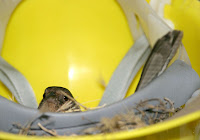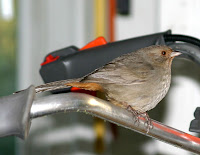
The chaparral environment we live in is particularly rich in bird life, and the California Towhee is one of the more common birds here. This particular female towhee decided that our enclosed patio (which is filled with all sorts of junk), and in particular this hanging safety helmet, was exactly the right place for her nest. I first noticed the nest a week or so ago, by the little piece of straw hanging out. I took the helmet off its hook and looked inside, and there was the nest, complete with five light blue eggs, speckled with black, gray, and brown. I carefully put the helmet back, and to my relief the momma towhee went right back to it.
Over the past week, we've been watching momma, and she's gradually gotten more used to our comings and goings. The helmet happens to be hanging right over a doorway that leads out of our patio and into our outdoors cattery. This isn't the kind of peaceful, out-of-the-way place I'd imagine a mother towhee would be looking for! We use that doorway perhaps 10 or 12 times a day, and there are two cats in easy visual range of the nest. But momma must have liked it for some reason...
 This morning I took my camera to see if I could get a picture or two. I took the first picture with a flash from about 6 feet; momma seemed completely unperturbed. I then put a stool about 3 feet from the nest and stood up on it — momma didn't like that one bit! She took off suddenly from the nest (startling me), and then landed a few feet away, scolding me. To my surprise, she then started darting at me, obviously trying to scare me away or to get my attention. She even landed briefly on my hand (still holding the camera) and flapped about. I stepped off the stool and momma landed on the handle of a hanging weed whacker, where I took this second picture (from about 8 feet, again with a flash). When I stepped back a couple of feet, she went right back to the nest.
This morning I took my camera to see if I could get a picture or two. I took the first picture with a flash from about 6 feet; momma seemed completely unperturbed. I then put a stool about 3 feet from the nest and stood up on it — momma didn't like that one bit! She took off suddenly from the nest (startling me), and then landed a few feet away, scolding me. To my surprise, she then started darting at me, obviously trying to scare me away or to get my attention. She even landed briefly on my hand (still holding the camera) and flapped about. I stepped off the stool and momma landed on the handle of a hanging weed whacker, where I took this second picture (from about 8 feet, again with a flash). When I stepped back a couple of feet, she went right back to the nest.
Brave, good momma...
P.S. Click on the pictures for a larger verion...
